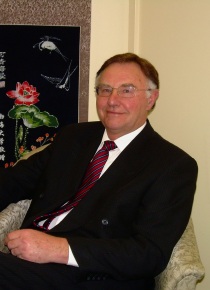ROBINSON, Professor Wayne

BVSc(Hons)., MVSc., PhD., MACVSc., DACVP.
Employment history:
1968-1969: Veterinary Officer, Commonwealth Department of Primary Industry
1970-1972: Veterinary Pathologist, University of Melbourne
1972-1977: Graduate Research Associate; Assistant Professor, The Ohio State University
1977-1993: Lecturer; Senior Lecturer; Associate Professor, Murdoch University
1993-1999: Professor, the University of Queensland
1999-2001: Deputy Vice-President [Academic] Deakin University
2001-2010: Deputy Vice-Chancellor [Academic and Research], University of BallaratWhat are some of your career highlights?
Over my long career, four broad highlights stand out like beacons and they are: having the opportunity to enter and contribute to my profession of veterinary science; the continuing satisfaction and excitement from being involved with teaching students at three universities; a long, fulfilling and productive research career; and, finally, the opportunity to influence the strategic direction of learning and teaching and research at the University of Ballarat.
I commenced my studies in veterinary science with mixed feelings: the exhilaration of studying the discipline of veterinary science itself and the daunting prospect of the high expectations of my university lecturers. My undergraduate career taught me the twin values of becoming engaged with each subject and trying as hard as possible to come to grips with the principles that informed the detail of each subject. It was then, and remains to this day, a golden age for the broad sweep of the biomedical sciences and it was certainly a highlight to be part of that. The final highlight of my formal years of study was the opportunity to travel to the United States, and complete a doctorate at the Ohio State University and also to qualify as a specialist in veterinary pathology. That was an experience of fundamental importance. It seemed that in the United States even greater emphasis was placed on attracting the brightest minds to provide the most vibrant undergraduate and postgraduate education. This was accompanied by the highest expectation of all students at the university.
After returning to Australia to join the faculty at Murdoch University in 1977, the thrill was to join with my fellow faculty members and construct a brand new curriculum at a brand new university. The fundamental precept was to draw on the world's best so that the curriculum was second to none. The outstanding highlight was the publication with my colleagues, by Cambridge University Press, of a textbook in my discipline that encompassed these ideals.
Achievement in research is a source of great satisfaction to me and especially the research that provided solutions to problems of significance to comparative medicine and to the animal industries. While I have researched many topics which have resulted in 150 or so publications, the research into infectious diseases such as those viruses in animals closely related to HIV was the most stimulating and rewarding.
Finally, having a central role to play in the strategic direction of learning and teaching at the University of Queensland, Deakin University and the University of Ballarat in the period 1997-2010 was, without doubt, a major highlight. To provide both staff and students with the encouragement and funding to realise their aspirations is a fitting finale to my career. It is especially gratifying to see that the University of Ballarat now has a 5-star rating for good teaching - a wonderful reward for the many years of work by all staff at the University.
Describe the most enjoyable and challenging aspects of your job:
Without question the most enjoyable aspect of my time at the University of Ballarat has been to do all that I could to create an environment that encouraged both students and staff to achieve the goals they have set for themselves - to be the best that they can be.
To see the bright faces of students at graduation and to see the careers of academics blossom through their achievements in teaching and research was most rewarding. Building research by doubling the professoriate, recruiting research-active staff and developing initiatives such as the early-career researchers program designed for junior members of staff to realise their research potential.
The great challenge has, and continues to be, continually improving the quality of teaching and research at the University. We have, as a university, become more attuned to the national standards for teaching and research and we're meeting that challenge, especially in learning and teaching.
What are your strongest memories while you were studying at the University of Ballarat?
The absolute and continuing commitment of staff to help students achieve their aims and ambitions.
Also of students, both from Australia and overseas, who come to the University of Ballarat who may be less than well prepared for tertiary education, but with help of teaching and administrative staff, develop their sense of what can be done and graduate from the university as independent learners and graduates of which the University can be truly proud.
Do you have any advice about life after study to pass on to current students?
The one piece of advice for graduates about life after study is that it is just the beginning to becoming the best you can be in your field. Your university education has provided the framework and has helped you refine your abilities to approach new challenges confident in your ability to discover the fundamentals of any issue, to analyse its component parts, to bring it all together into a coherent whole, and to effectively communicate that analysis and synthesis. The mark of a good graduate is one who continues to learn and develop those attributes throughout their professional life.